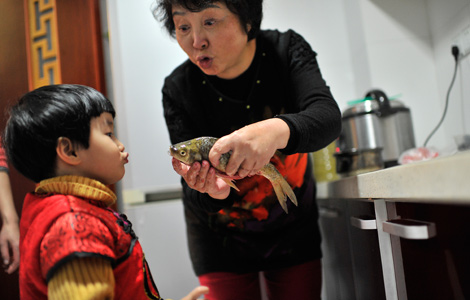Caregivers in high demand
Updated: 2013-12-25 01:57
By Zheng Xin (China Daily)
|
||||||||
A shortage of trained manpower, especially in elderly care, may be the biggest impediment for city officials in their efforts to provide adequate facilities for the growing aging population in Beijing, officials said.
Demand for elderly care professionals in the city is expected to be around 100,000 by the end of 2015, according to government figures. However, the current availability of such professionals is just 5,000, officials said.
"It's important that Beijing comes up with more professionals who are willing to take up elderly care as a profession," said Du Peng, a professor with the Institute of Gerontology at Renmin University of China.
"With some 400 Beijing residents celebrating their 60th birthday every day, the current number of elderly care professionals are far from adequate to meet the requirements."
By the end of 2012, Beijing had over 2.63 million residents aged above 60 years, accounting for more than 20 percent of the total city population. That number is expected to see a 30 percent growth by 2040, according to estimates from the Beijing Civil Affairs Bureau.
With an eye on mitigating the personnel shortage problem, city officials are urging educational institutions to come up with more majors on pension services and also increase student intake for such courses.
Li Jiyan, head of Beijing Vocational College of Labor and Social Security, said his college has a 100 percent employment record for students who have graduated in elderly services and management. Most of these students are working in nursing homes for the aged, he said adding that, in many cases the students were hired on campus one year before their graduation.
Beijing Youth Politics College, another college that offers such courses, also indicated that it was planning to increase student intake for aged care and management courses next year.
According to Wang Xiaolong, head of the Cuncaochunhui Home for the Aged, an elderly care facility in Chaoyang district, brain drain, high land and maintenance costs, especially for clinics run by the private sector, are major impediments for the development of the sector.
"The industry has a very low recruitment standard, or in some cases no standard at all," said Wang.
"Young people, especially those with a professional background, are not willing to take up elderly care as a profession due to the low salaries. The middle-aged professionals, aged between 40 and 50, hardly possess the required technical expertise for taking care of senior citizens," he said.
Du from Renmin University of China said that most of the caregivers in the city's elderly care facilities are women who are above 45 years of age and come from villages or the countryside.
"Low salary is a major obstacles that is preventing fresh graduates from working in the industry," he said.
The absence of elderly care courses in most of the major universities and colleges have also contributed to the lack of talent, Du said.
"Majors like old-age care are only available in some vocational schools and private colleges," said Du. "You barely hear of gerontology majors in the comprehensive institutes of higher education."
In addition, with different qualifications, it's easy for the nurses at hospitals to go to the nursing homes taking care of the old, while it is impossible for the caretakers in these facilities to go back to the hospitals.
"This prompts many students to obtain a nursing certificate while at school so that they can be attached to the hospitals. Only those who fail to get such a job will end up at the nursing houses," he said.
It's important for hospitals and nursing homes to work more closely and allow free exchange of talent with each other, said Du.
"Caretakers at most of the nursing institutes are at crossroads as they hardly see any chance for future development, professional advancement and new job opportunities in the next five to 10 years."
It's also important for the government to provide better compensation packages and vocational development opportunities for elderly care professionals, Du said.
Most Viewed
Editor's Picks

|

|

|

|

|

|
Today's Top News
Delicious, festive holiday choices abound for expats
Shanghai to soar on FTZ wings
Mend ties, top adviser tells Tokyo
Experts defend hepatitis B program
Tight budgets of the elderly cause issues for industry
Caregivers in high demand
City seeks to cut costs for private care
FTZ offers 'huge potential' to pare cargo shipping times
US Weekly

|

|















